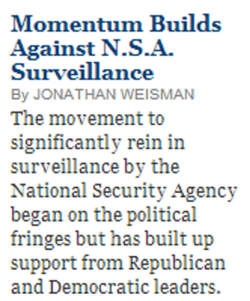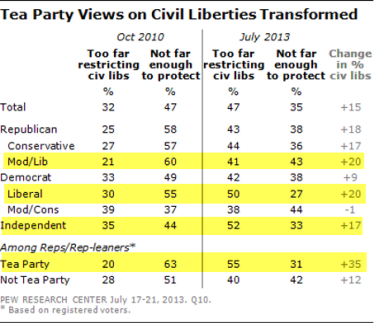So after three years of abuse in a military prison, confinement called cruel, inhuman and degrading by the UN, Bradley Manning has been convicted of the crime of telling the truth in yet another kangaroo military court dead set on setting an example to others who would have the courage to follow their ethical convictions and resist the developing American fascist state.
Here are several articles, statements, an audio, and video, about the conviction of Bradley Manning for reporting the truth to the world concerning the behavior of our military and foreign policy establishment.
__________
The sun rose with a moral verdict on Bradley Manning well before the military judge could proclaim his guilt. The human verdict would necessarily clash with the proclamation from the judicial bench.
In lockstep with administrators of the nation’s war services, judgment day arrived on Tuesday to exact official retribution. After unforgiveable actions, the defendant’s culpability weighed heavy.
“Our apologies, good friends, for the fracture of good order, the burning of paper instead of children, the angering of the orderlies in the front parlor of the charnel house,” another defendant, Fr. Daniel Berrigan, wrote about another action that resulted in a federal trial, 45 years earlier, scarcely a dozen miles from the Fort Meade courtroom where Bradley Manning faced prosecution for his own fracture of good order.
“We could not, so help us God, do otherwise,” wrote Berrigan, one of the nine people who, one day in May 1968 while the Vietnam War raged on, removed several hundred files from a U.S. draft board in Catonsville, Maryland, and burned them with napalm in the parking lot. “For we are sick at heart…”
On the surface, many differences protrude between those nine draft-files-burning radical Catholics and Bradley Manning. But I wonder. Ten souls saw cruelties of war and could no longer just watch.
“I prefer a painful truth over any blissful fantasy,” Manning wrote in an online chat. Minutes later he added: “I think I’ve been traumatized too much by reality, to care about consequences of shattering the fantasy.” And he also wrote: “I want people to see the truth … regardless of who they are … because without information, you cannot make informed decisions as a public.”
Those words came seven weeks after the world was able to watch the “Collateral Murder” video that Manning had provided to WikiLeaks. And those words came just days before military police arrived to arrest him on May 29, 2010.
Since then, huge numbers of people around the world have come to see Bradley Manning as personification of moral courage. During the last several months I’ve read thousands of moving comments online at ManningNobel.org, posted by signers of the petition urging that he receive the Nobel Peace Prize. The comments are often stunning with heartfelt intensity of wounded idealism, anger and hope.
No verdict handed down by the military judge can change the moral verdict that has emerged from people all over the world, reciprocating what Bradley Manning expressed online a few days before his arrest: “I can’t separate myself from others.” And: “I feel connected to everybody … like they were distant family.”
The problem for the U.S. government was not that Bradley Manning felt that way. The problem came when he acted that way. Caring was one thing. Acting on the caring, with empathy propelling solidarity, was another.
Days ago, in closing argument, the prosecutor at Fort Meade thundered: “He was not a whistleblower, he was a traitor.”
But a “traitor” to what? To the United States … only if the United States is to be a warfare state, where we “cannot make informed decisions as a public.” Only if we obey orders to separate ourselves from the humanity of others. Only if authoritative, numbing myths are to trump empathy and hide painful truth.
__________Norman Solomon is co-founder of RootsAction.org and founding director of the Institute for Public Accuracy. His books include “War Made Easy: How Presidents and Pundits Keep Spinning Us to Death.”
__________
Democracy Now! Special Coverage on the Bradley Manning Verdict.
__________
Posted By Elias Groll
 Tuesday, July 30, 2013
Tuesday, July 30, 2013In a statement, the American Civil Liberties Union described the Manning prosecution as nothing but an exercise in intimidation. "Since he already pleaded guilty to charges of leaking information -- which carry significant punishment -- it seems clear that the government was seeking to intimidate anyone who might consider revealing valuable information in the future," said Ben Wizner, the director of the group's Speech, Privacy and Technology Project. If those activists are looking for confirmation of their fears, they need look no further than a joint statement from Reps. Mike Rogers and Dutch Ruppersberger, the chairman and ranking member, respectively, of the House Permanent Select Committee on Intelligence: "There is still much work to be done to reduce the ability of criminals like Bradley Manning and Edward Snowden to harm our national security. The House Intelligence Committee continues to work with the Intelligence Community to improve the security of classified information and to put in place better mechanisms to detect individuals who abuse their access to sensitive information."
• Manning convicted of multiple Espionage Act violations
• Acquitted of most serious 'aiding the enemy' charge
• Army private faces maximum jail sentence of 130 years
By Ed Pilkington at Fort Meade
July 30, 2013 "The Guardian" - Bradley Manning, the source of the massive WikiLeaks trove of secret disclosures, faces a possible maximum sentence of more than 130 years in military jail after he was convicted of most charges on which he stood trial.
Colonel Denise Lind, the military judge presiding over the court martial of the US soldier, delivered her verdict in curt and pointed language. "Guilty, guilty, guilty, guilty," she repeated over and over, as the reality of a prolonged prison sentence for Manning – on top of the three years he has already spent in detention – dawned.
The one ray of light in an otherwise bleak outcome for Manning was that he was found not guilty of the single most serious charge against him – that he knowingly "aided the enemy", in practice al-Qaida, by disclosing information to the WikiLeaks website that in turn made it accessible to all users including enemy groups. ....See "The Guardian"
__________














